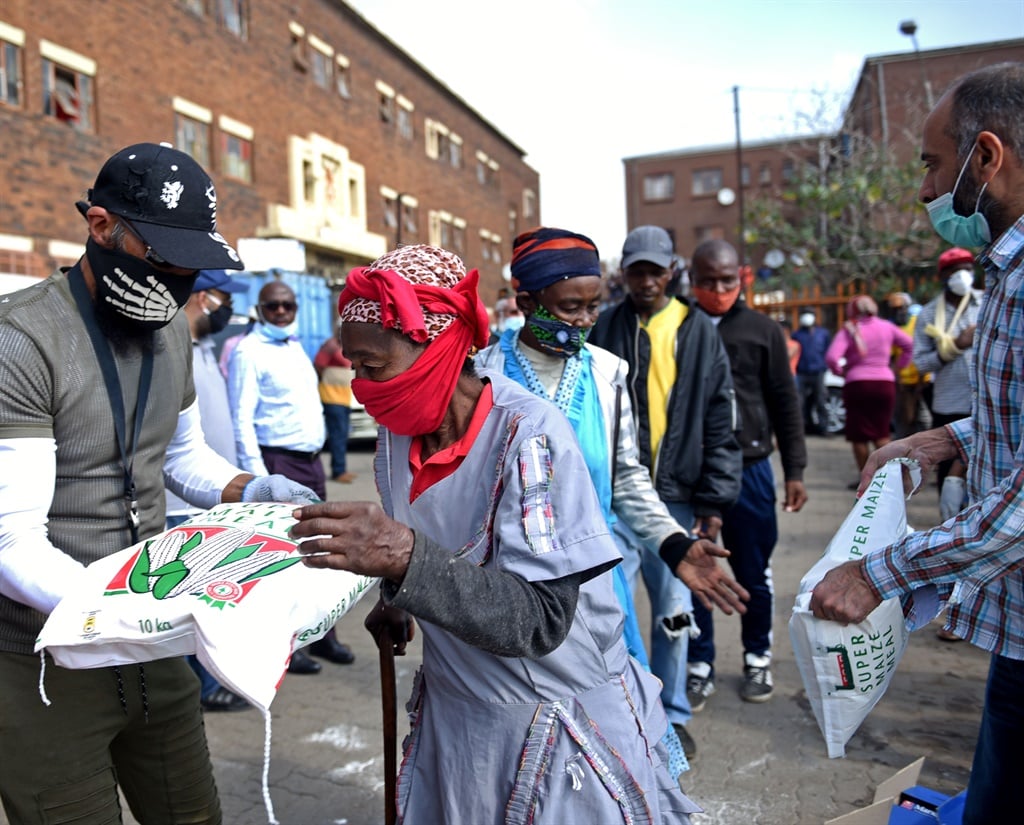


Elderly people from Denver Hostel collect food parcels donated by the Uwais Qarni Islamic Centre. Picture: Tebogo Letsie
Marc Lubner writes that South Africans have misplaced Mandela’s spirit of doing good for humanity.
It was a beautiful day when Nelson Mandela and I met at his home in the late 1990s to brainstorm the programme of the Smile Foundation. As we fired off ideas at one another, our former president fell quiet for a moment.
Smiling his Madiba magic smile, he called his secretary and asked her to give my then 12-year-old daughter, who had tagged along for the day, a notebook and a pen. “I would like you to take minutes,” he told Takara. “I don’t want any South African, rich or poor, young or old, to sit around and do nothing.”
His unstoppable drive to make a tangible and lasting difference in our country, a profound desire to work with others to achieve this goal, and an almost subhuman ability to inspire people from all walks of life to join him on this quest are the essence of who Nelson Mandela was. Not only that; they have become the cornerstone of our beloved country’s humanity.
Misplaced spirit
Somewhere down the line, we seem to have temporarily misplaced this collective spirit, probably because of the avalanche of challenges we have faced for the past decade, from State Capture to the energy crisis.
Our latest challenge, the biggest we have faced in recent times, has revived our spirit of humanity and togetherness.
As devastating as the Covid-19 pandemic may be for people, businesses, and our economy, it has pulled South Africans from all walks of life closer in a collective drive to assist those in need and help our country weather what I can only describe as a superstorm.
The Cape Town Together Community Action Network, a collective of dozens of neighbourhood-based initiatives that feed, clothe, and shelter the vulnerable, is an excellent example of what people can achieve when they join hands. Afrika Tikkun’s food distribution to over 70 000 families was effected through partnering with local NGOs and existing community-based organisations to achieve optimal impact.
This network’s collaborative approach allows for existing organisations to pool its resources and infrastructure instead of building new systems from scratch. This enables them to scale their interventions much faster than when working in silos.
This has been Afrika Tikkun’s philosophy for quite some time. Sure, Afrika Tikkun started as a “vanilla” NGO founded by a group of privileged but concerned individuals who felt they needed to give back by building soup kitchens and computer classrooms. Whilst we thought we were building communities, we were only supplementing them. The changes we brought were heartfelt, but not optimally impactful.
Whilst the job to be done is still enormous, we intend to change this with how we empower young South Africans, an approach that stretches from the moment they are born to the day they sign their first employment contract.
Besides being a holistic and sustained effort, the success of our Cradle-to-Career approach is rooted in partnerships with our beneficiaries and their communities. As the vulnerable are living their harsh realities every single day – the very realities we as outsiders seek to improve – they know what works and doesn’t work to help change things around.
Partnerships
What do I, a white male who has lived a privileged life, know what it feels like to go to bed hungry, live in a shack without water and electricity, not have access to basic services, and struggle to find a job despite a university degree? Involving young people as partners is a no-brainer if we are to figure out sustainable solutions.
Our partnerships with civil society organisations, private businesses, and the government are also fundamental. These have helped us cast our nets wider so that more young South Africans can thrive, not just survive.
As the Corona pandemic rages on, I am urging South Africans – individuals and business owners alike – to embrace our humanity and spirit of togetherness and use it as the fuel to move our country towards a new normal.
The truth of the matter is that we don’t want to return to what we considered normal.
Our pre-Covid situation, characterised by endemic inequality and sheer deprivation, should not be normal. A future in which equality, compassion, and bravery can flourish; and where privilege, greed, and entitlement are scrutinised, and inequity and exploitation have no leg to stand on – that is what we must strive for.
Does it sound impossible? Certainly. But as Madiba once said so profoundly: “It always seems impossible until it’s done.”
– Marc Lubner is the Afrika Tikkun Group CEO.
*Want to respond to the columnist? Send your letter or article to [email protected] with your name, profile picture, contact details and location. We encourage a diversity of voices and views in our readers’ submissions and reserve the right not to publish any and all submissions received.
Disclaimer: News24 encourages freedom of speech and the expression of diverse views. The views of columnists published on News24 are therefore their own and do not necessarily represent the views of News24.

